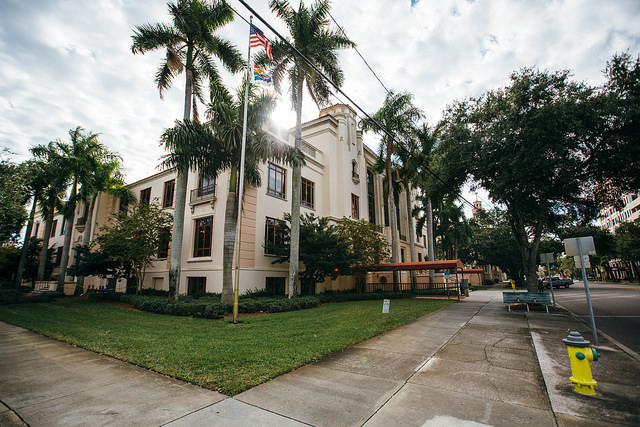The St. Petersburg City Council will consider the annual legislative agenda next week at its regular meeting.
The city’s Legislative Affairs & Intergovernmental Relations Committee signed off on the priorities earlier this month. The agenda addresses some hot-button issues, including Florida’s new open carry law, established when a Judge struck down Florida’s ban on open carry, and discussions about reducing or eliminating property taxes, which in part fund local governments.
The Legislature convenes for the 2026 Session on Jan. 13, and committee weeks are already ongoing.
The city’s proposed legislative agenda is broad, including priorities for hurricane preparedness and response, housing, education, arts and development, and neighborhood health and safety.
It’s heavy on emergency response asks, an emphasis fueled by the city’s ongoing recovery from last year’s Hurricanes Helene and Milton. In the case of Helene, widespread flooding highlighted the need for flood mitigation. Milton’s high winds, which blew the roof off Tropicana Field and toppled a construction crane downtown, showed the need for storm hardening.
The agenda asks the Legislature to increase funding for the Resilient Florida Grant Program, which provides funding for cities, counties and certain special districts to analyze and plan for vulnerabilities and implement projects. The program is aimed at increasing storm resilience, response and recovery.
Also related to the area’s storm vulnerability, the city is asking the state to support programs that train workers in home elevation, flood mitigation, emergency preparedness and civil engineering. The agenda also includes urging legislative support for the Elevate Florida Program, a first-of-its-kind program from the Division of Emergency Management that taps federal funding to help elevate structures, conduct reconstruction mitigation and implement wind mitigation.
The priorities also address a much-discussed ruling striking down Florida’s open carry ban, establishing the state as an open carry state.
The agenda asks lawmakers to extend firearm prohibitions to sensitive locations such as courthouses, schools and committee and other municipal meetings.
The legislative priorities address property tax reform, another issue in the headlines recently.
The agenda urges lawmakers to focus such reforms on homestead properties, and to “acknowledge the need for revenue replacement to ensure the continuity of key public safety services.”
That ask comes as Gov. Ron DeSantis has called to eliminate property taxes entirely. House Speaker Daniel Perez, meanwhile, has introduced seven potential property tax referendums, which could appear on the 2026 ballot.
Those proposals seek to reduce property taxes in a number of ways, including incremental reductions, elimination for seniors, homestead exemptions, and more. All of the House proposals from Perez would protect the portion of property taxes used to fund public education.
On housing affordability, an issue plaguing the entire nation, the legislative agenda encourages the Legislature to continue fully funding the Sadowski Fund, which supports affordable housing projects and had, in years past, been subject to sweeps of its funding for non-housing purposes.
The agenda also includes an ask to identify ways to lower property insurance costs and to support the My Safe Florida Home and My Safe Florida Condo programs, which provide grants to qualified applicants for wind mitigation.
The priorities also address Community Redevelopment Areas (CRAs), which are established to establish a funding source earmarked to develop, redevelop and otherwise improve low-income or economically disadvantaged or blighted areas. The city’s proposed agenda asks lawmakers to protect CRAs, which have been consistently under attack as establishing slush funds for cities and counties.
On education, the proposed legislative agenda includes urging the state to participate in Summer meals programs, which provide healthy food for kids, and sometimes their families, when they are out of school. Such programs are established to address challenges that students who rely on school meals face during the Summer months when school is not in session.
The agenda also calls for supporting after-school programs and collegiate academic programs to prepare students for careers in tech and innovation.
Other asks include help with lowering the cost of public safety equipment, which has been on the rise and causing fiduciary challenges for police and fire departments. The agenda also seeks to streamline necessary certification and operational requirements for child care facilities and to continue supporting subsidies or tax credits for families and businesses, to increase access to affordable child care.
During the committee meeting Oct. 16 when the priorities were first discussed by the Council, members raised a number of concerns that could again be brought up next week.
Council member Lisset Hanewicz pointed to already approved legislation (SB 180) filed by Sen. Nick DiCeglie that dictates local hurricane preparation and response and is seen by some as an attack on home rule, even as others see it as a way to ensure proper preparedness and recovery. The bill includes language that prohibits cities from adopting policies more restrictive or burdensome than what is already in place until October 2027.
Hanewicz lamented that the restriction only further ties the city’s hands in mitigating storm risk, according to the St. Pete Catalyst.
Brandi Gabbard also flagged HB 48 as something that could allow for more accessory dwelling units, something that could provide affordable housing options for residents, but that should be monitored for provisions that may not be as appealing, the Catalyst reported.
The Southern Group, one of the state’s largest and most influential lobby shops, is representing the city’s interests before the Legislature and reportedly told Council members that they should expect this Legislative Session to be a “little bit crazier,” noting that DeSantis is now a lame duck Governor, as are Legislative leaders Perez and Senate President Ben Albritton. That, lobbyist Jon Stewart warned, according to the Catalyst, means lawmakers might be “looking to cut spending even more this time.”
The City Council will take up the legislative agenda at its meeting next Thursday, Nov. 6, at 1:30 p.m.



